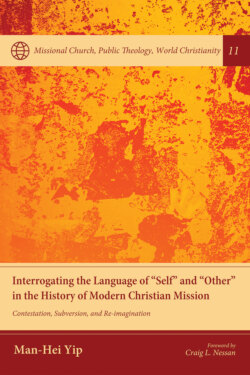Читать книгу Interrogating the Language of “Self” and “Other” in the History of Modern Christian Mission - Man-Hei Yip - Страница 7
На сайте Литреса книга снята с продажи.
Preface
ОглавлениеSeveral years ago, I presented a paper on language and the expansion of Christianity at a mission conference. I questioned the language used in missionary activities and how that might help dichotomize worldviews, demarcates groups, and creates distinctions between us and them. After my presentation, someone came up to me and said all derogatory terms were corrected and dwelling on past mistakes would get us nowhere.
There are people who passionately embrace the progress rhetoric and downplay the history of colonialism and its ensuing impact on indigenous people’s life and their cultures. Certainly, there are good things about missionary work; however, there are bad things, too. The latter regularly receive minimal attention. Denial grants an easy access for those who desire to divorce themselves from a reality they do not like, and it is the reality of losing power and control.
If missionary (mis)demeanors have all been “corrected,” complaints about missionary practices should have died down. General perceptions of missionary work have not been changed completely. The indigenous or leaders from the Global South continue to speak against misrepresentation and imposition of values. Are mistakes corrected, sincerely?
One may wonder if the “solution” made by mission societies and institutions is able to trickle down into revolutionary changes for missionary practice worldwide. We need also to ask if the language crafted in the discourse rightly and justly speaks to power. Any claim that arbitrarily presumes “optimism” of the missionary movement is involved in a modern form of imperialist brainwashing. Similarly, the thought that past mistakes in missionary activities have all been corrected is no different from policing and regulating the speech. This is appalling when the dissonant voice is allowed but restricted to the level that does not run counter to the myth of progress deposited in the global Christian missionary movement.
Rendering the dissonant voice as outdated, predictable, and lacking creativity is clearly an attempt to coerce the other to speak the same language as the mission societies and agencies speak. This form of coercive behavior aims to wipe out certain individuals’ past and histories. By sustaining the kind of discourses that endorse self-glorification in the achievement of missionary work, regulating the speech of the other intensifies the process of Western domestication of the entire Christian missionary movement.
Christian mission cannot rely on a top-down approach that ignores the gifts of Christian witness and other religions from the majority world. Nobody can speak and act for the other. There is no way for “us” to talk about the future of Christian mission, when spreading half-truths about the people continually normalizes missionary practice. Some regions in the world are yet to phase out the colonial status. Countries that have gained independence are still experiencing political instability. When we ignore the impact of colonialism or simply refrain from talking about it, we erase the memories of many who have suffered from colonial hegemony. People of later generations are less likely to be sensitive and sympathetic to the pain of the colonized. Learning from the past, including mistakes and failures, is a viable option to heal and to move forward.
Language and Christian mission intersect in complicated ways to subjugate the other in cross-cultural encounter. While the history of Christian mission is predicated on the construction of otherness, our missiological language fails to evaluate how language as a structure of authority reinforces prejudicial thinking, condones aggressive behaviors, and secures one’s dominant role in the field.
This book will first indicate how prevailing mission discourses fall short of addressing power imbalances in relationships. Critical theories are useful tools to help unmask the binarial relations, and contest established ideas of otherness or imperialist discourses that sought to otherize the other. Christian mission turns out a platform for expressing one’s individuality devoid of the other’s voice, and mission discourses have strengthened such self-centeredness that was even documented in the ecumenical meetings over the centuries.
The task of confronting self-centric motivations becomes particularly relevant concerning the future of Christian missionary movement. Reconstructing self urges us to rethink who we are that further creates a pathway for human flourishing. In the meantime, reconceptualizing otherness is decisive for missiological exploration if the mission enterprise must deliver value to all stakeholders in its undertakings. A more effective way of upholding the dignity of other is to see otherness as gift. The emergent discourse can subvert narrative that continues to fetishize the indigenous as cultural stereotypes. This affirmation represents an incredible game-changer in the missionary movement.
Language in missionary work should always aim to reestablish broken relationships between one and other. This is of vital importance for a world that is dominated by bigoted discourses, lies, and hate speech. Any responsible missiological language should acknowledge the agency of the other, which will eventually materialize a persuasive statement that the other is an active participant in human history. The new language symbolizes an act of resistance to the narrative that divides.
Boston, Massachusetts
2019
